This DIY all purpose cleaner without vinegar is made with natural, effective cleaning ingredients that actually smell great! The recipe is easy, cost-effective and (an added bonus!) it works!
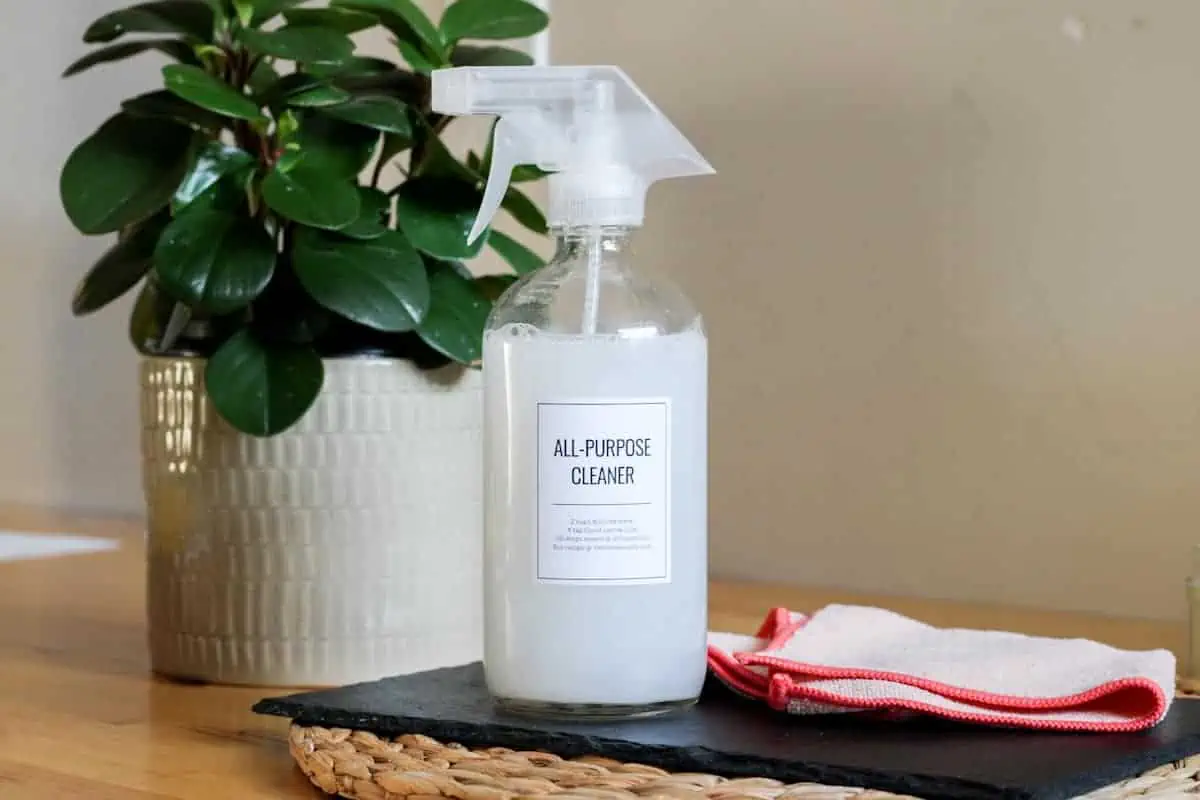
Homemade cleaners were one of the first things on my list to try when I started to rid my house of chemicals. There is no doubt about it- chemical cleaners are effective, but at what cost? The thing that bothered me the most about store-bought products was the smell- it made my head hurt and sometimes made me feel sick to my stomach. I felt like I couldn't breathe for an hour after using it, even with fans blowing and windows open. Not what I wanted to experience every time I needed to clean something! And if that's what happened to me after just using it once, imagine the effects on my body over years of using these chemicals.
There are a lot of natural cleaning products on the market as well, but they are quite costly and I'm still not confident they are the most natural and nontoxic option. You just never REALLY know what they put in there!
So I tried a lot of natural all purpose cleaner recipes, and honestly most of them worked pretty well, but they had white vinegar. The smell of vinegar doesn't bother me physically (no headaches or nausea) but I just don't like how it smells! It's very strong, even when combined with essential oils or infusing fruit with it for weeks. Just not my thing.
Then I found this easy recipe using Dr. Bronner's castile soap and essential oils and played around with the measurements until I found what worked just right for me. I already used Dr. Bronner's regularly in my hand soap and body wash recipes, so I had it on hand to try right away.
It's an effective cleaner in so many situations! It's so easy to make, extremely cost-effective and I love that I can customize the scent with essential oils.
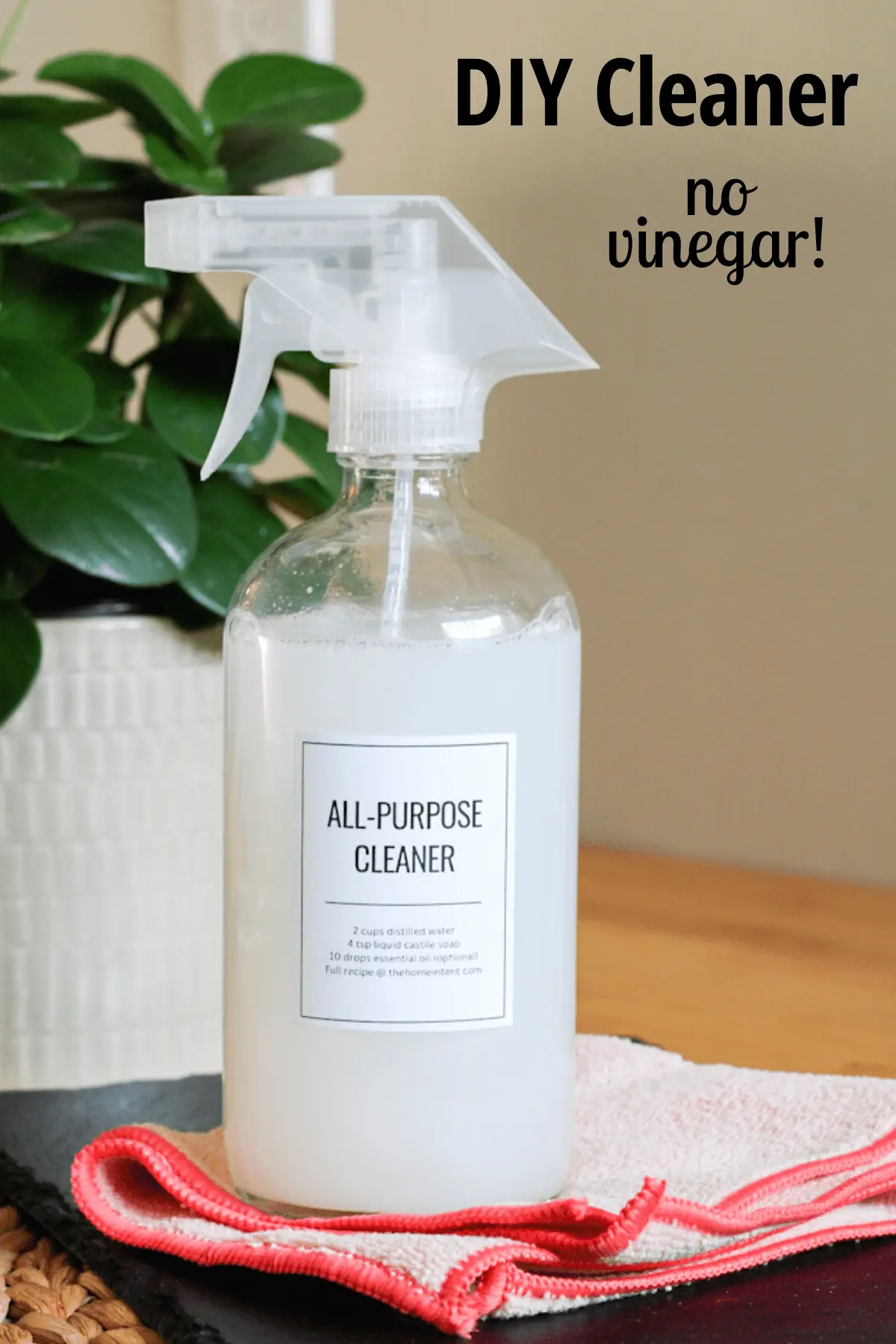
Do DIY Cleaners Really Work?
Yes. There are natural ingredients that can handle ordinary household grease and grime. Castile soap is non-toxic and has handled the every day cleaning for me. Lots of people have had the same experience, but you'll just have to try to find out for yourself!
Why Wouldn't You Want to Use Vinegar?
When I first started looking for an all purpose cleaner recipe, most of them contained vinegar. They are often infused with a citrus fruit peel to extract the oil from the fruit, which I thought would improve the scent and take away from that strong vinegar smell. Some say that it does, but that wasn't my experience. It smelled maybe 5% orange and 95% vinegar. Not my thing. So if you're not into the smell of vinegar, you probably won't want it in your all purpose cleaner.
Another reason to not use vinegar is the possible damaging effect. Over time, the acidity of vinegar on sensitive materials, particularly natural stone surfaces like granite countertops, can cause erosion of the sealant used to protect the stone. If there is no sealant on the stone, vinegar can cause etching or "burning" of the stone itself! You can safely use vinegar on most surfaces, but if you want an all-in-one type of cleaner that you know won't cause any damage, vinegar should be left out.
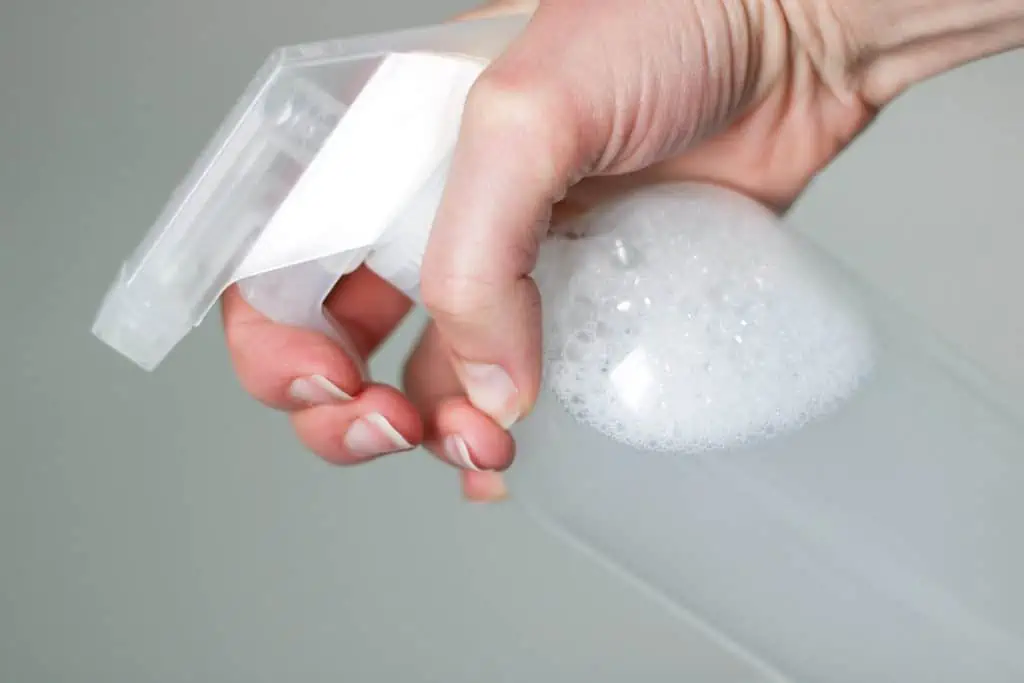
What is DIY All Purpose Cleaner Made Of?
Distilled Water - Whenever making any homemade home or personal product, using distilled water will give your product the maximum possible shelf life. You can find distilled water at most grocery stores and it is very affordable, especially if you are only using it for your homemade products. The next best options are filtered water (high-quality filtration like the Berkey water filter, which we love!) and boiled water (boiled for at least 10 minutes). Tap water contains bacteria that can potentially spoil your DIY concoction. So if your product won't be used in under a week, either use distilled, filtered or boiled water.
Liquid Castile Soap - A plant-based, natural, non-toxic and biodegradable soap made from vegetable oils (most commonly olive oil) and lye. It's highly concentrated, so a little goes a LONG way. I use this all the time in my DIY foaming hand soap and for different cleaning tasks around the house. It is also available in bar form that can be useful in other applications. Dr. Bronner's Baby Unscented is what I use since I can always customize the scent of my products with essential oils. I'm very happy with it. Discover all the many ways to use castile soap here!
Essential Oils - Some essential oils have excellent cleaning properties and they add a fresh, natural scent to your homemade cleaner. My favorite essential oil to use in this cleaner is lemon. It naturally disinfects and deodorizes and I just love a good citrus fragrance! My other favorite option is to combine rosemary, lavender, eucalyptus and peppermint (after much experimenting, I discovered I just love the smell of this combination)! Rosemary is naturally antifungal, antibacterial, antiseptic, lavender has antibacterial properties and deodorizes, eucalyptus is antibacterial and freshening, and peppermint is antibacterial as well as antifungal. It's a great combo for cleaning and smelling!
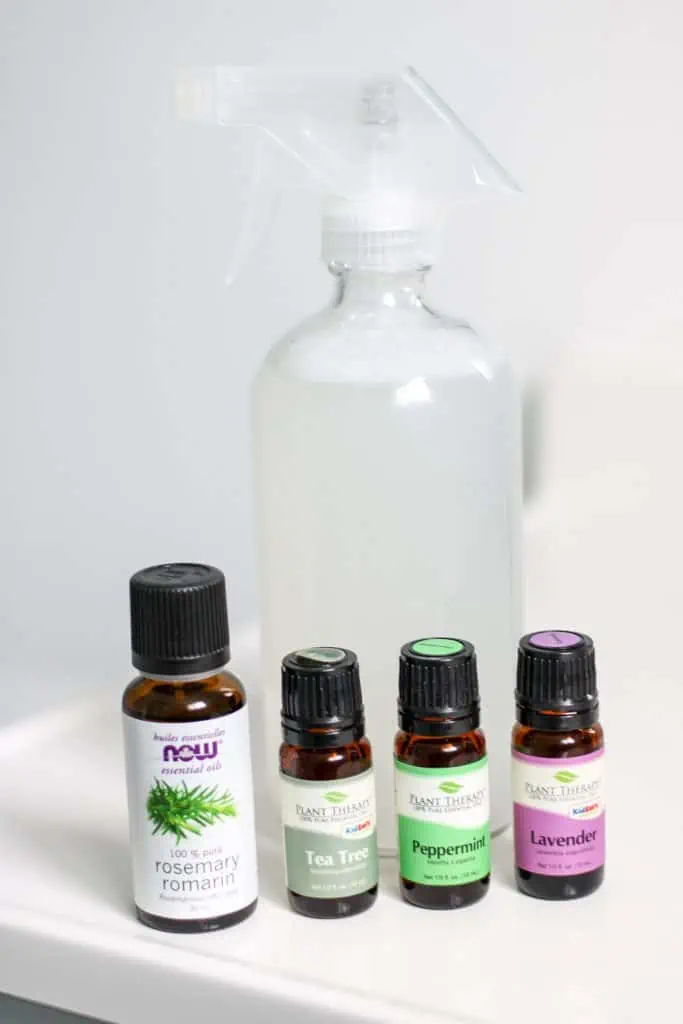
Cost of DIY All Purpose Cleaner Without Vinegar
Distilled Water - I use President's Choice Distilled Water 4L - $1.88 (at Real Canadian Superstore). I use 2 cups or 0.47 L in this simple recipe. 4L ÷ 0.47L = 8.51. So I use ⅛.51 of the 4L jug. $1.88 ÷ 8.51 = $0.22
Liquid Castile Soap - I use Dr. Bronner’s Liquid Castile Soap Baby Mild Unscented 32oz – $25.98 (at Real Canadian Superstore). I use 4 teaspoon or 0.66 oz of castile soap. 32oz ÷ 0.66 = 48.48. So every time I make this natural cleaning recipe, I use 1/48.48 of the castile soap bottle. $25.98 ÷48.48 = $0.54
Essential Oils - My favorite are the Plant Therapy Essential Oils, of which I have a 6 pack that's 2oz total– $41.55 (amazon.ca). 2 oz of essential oil is approximately 2000-2400 drops. $41.55 ÷ 2000drops = $0.02 per drop. I use 12-13 drops, so pay a maximum of $0.26 for essential oil in my DIY cleaner.
$0.22 + $0.54 + $0.26 =
TOTAL $1.02 CAN = $0.84 USD
So, SOOOO cheap!
What Kind of Spray Bottle Should I Use?
Invest in a couple of glass spray bottles if you can! Plastic bottles may leach chemicals into your homemade cleaner over time, making it more toxic than you were intending. That definitely won't happen with a glass bottle!
Many people will recommend amber glass bottles over clear ones, and here's why. Amber glass provides protection from UV rays, so if you are using a product that is light sensitive (like essential oils), it's best to keep them in amber. However, since my all purpose cleaner lives under the bathroom sink in a completely dark area and only sees the light of day when I'm using it, I haven't felt the need to make the switch, but I probably will eventually.
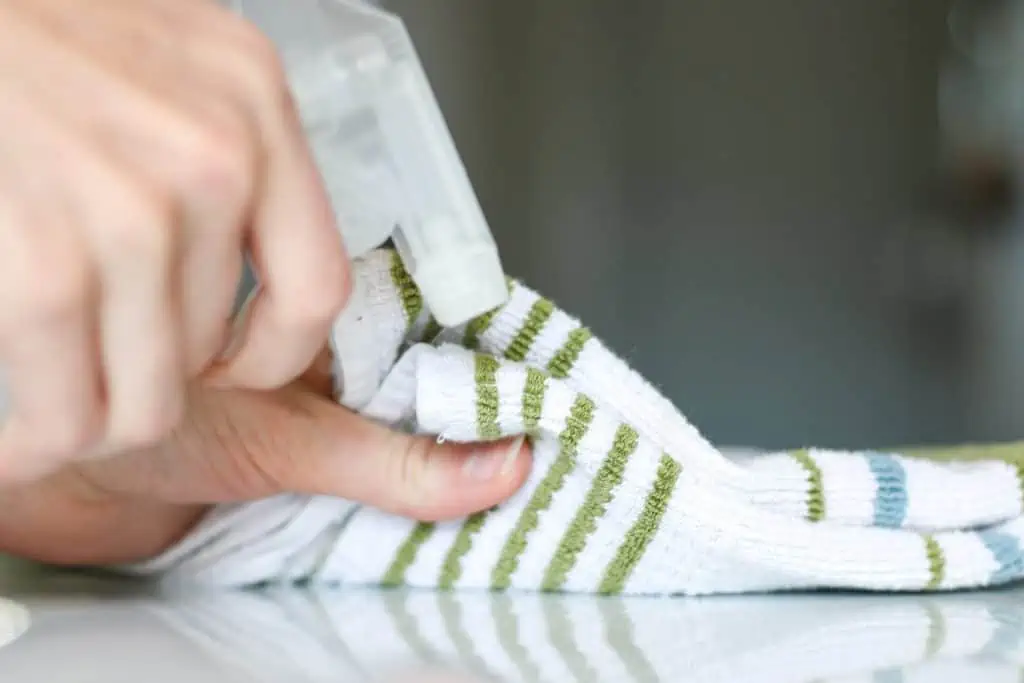
How to Use DIY All Purpose Cleaner
There are many applications for this cleaner! I've used both reusable cloths and paper towels with this cleaner and both work great. Many uses I've found are:
- general household surfaces
- bathroom counter tops and cupboards
- toilet (outer surfaces)
- bath/shower (spray everything with the cleaner, wet a soft cloth or sponge with hot water and sprinkle a little baking soda on your cloth/sponge. Wipe down bath/shower. You will barely even have to scrub, the soap scum melts away so easily!!)
- kitchen counter tops and cupboards
- outer surfaces of appliances
- waste bins
- high touch areas such as doorknobs or handles (although this cleaner does not sanitize)
- clean floors (spray directly on floor and mop, or put the solution straight into a spray mop)
- and many more!
I would not recommend using this cleaner to clean windows, mirrors or glass of any kind. The soap will leave a residue and you won't be able to get a clear, streak-free shine. I have a DIY glass cleaner that does a fantastic job and is just as easy to make as this all purpose one!
*As with any cleaner, it's wise to test on a small, inconspicuous area to ensure no damage occurs before proceeding with cleaning the entire surface.
Tools You May Need
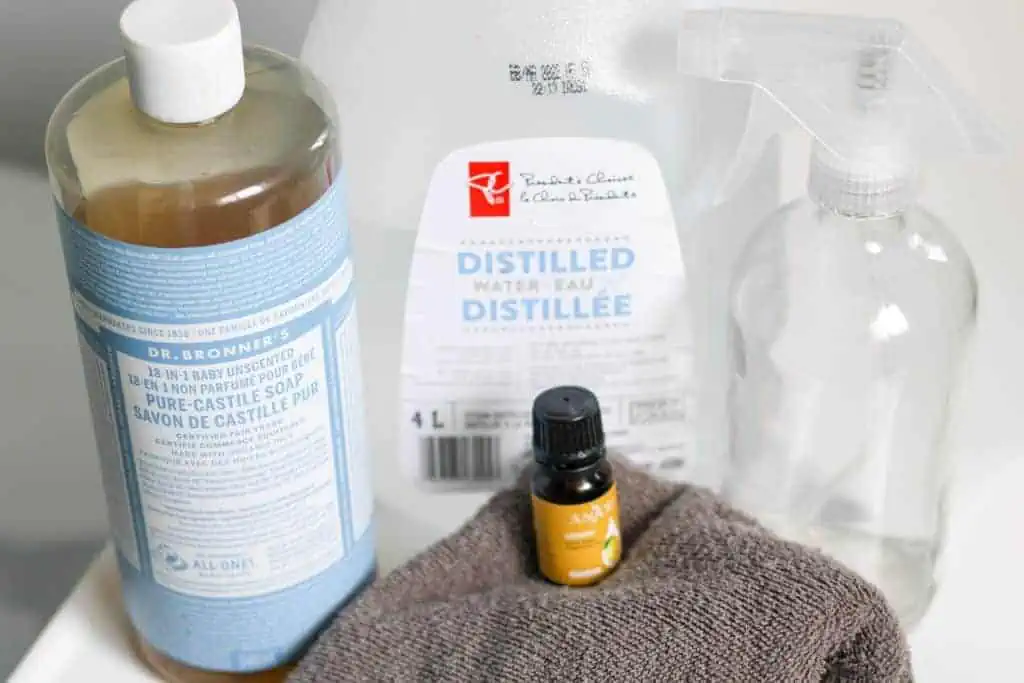
DIY All Purpose Cleaner Ingredients
2 cups distilled water
4 teaspoon liquid castile soap (if using scented, use only 3-5 drops essential oil, if any)
12-13 drops of essential oil (My favorites are lemon essential oil or a combination of tea tree oil, rosemary, lavender and peppermint)
How to Make DIY All Purpose Cleaner Without Vinegar
In a 16 oz (2 cups) glass spray bottle, use the funnel (or a really steady hand!) to add water first, then liquid castile soap and essential oils if using.
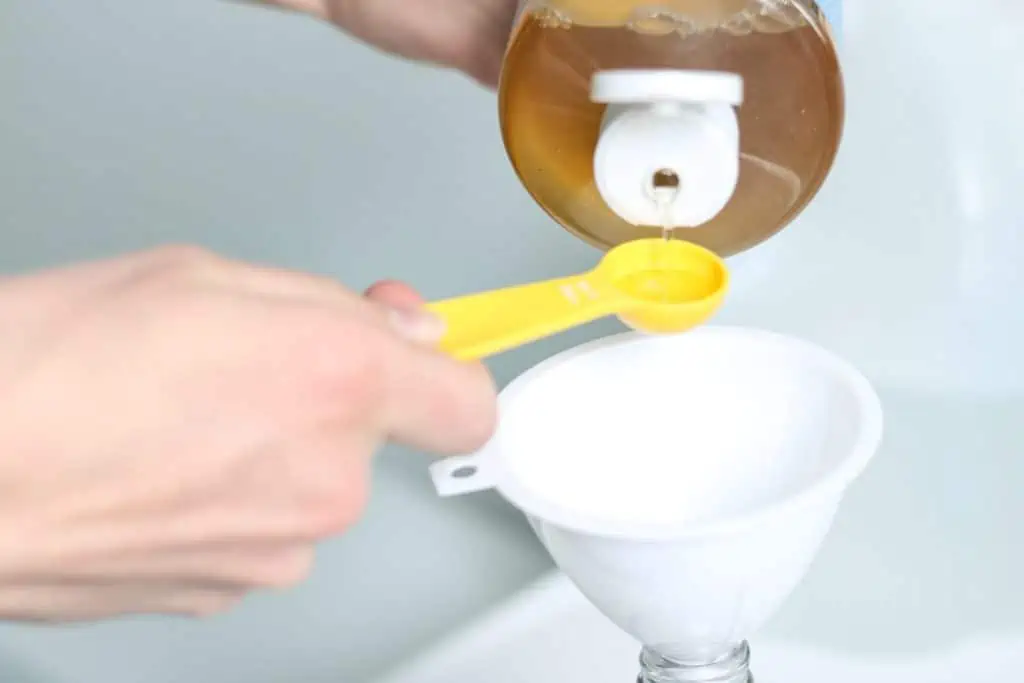
Give a gentle shake before each use to mix the ingredients as they will separate when stagnant.
PRINT A LABEL
More Natural Home and Personal Care
- DIY GLASS AND MIRROR CLEANER
- 29 USES FOR CASTILE SOAP
- FOAMING HAND SOAP
- DIY LIP OIL
- NATURAL FACE MOISTURIZER
If you loved this recipe, please come back, comment and give it a 5 star rating! Thanks!
📖 Recipe
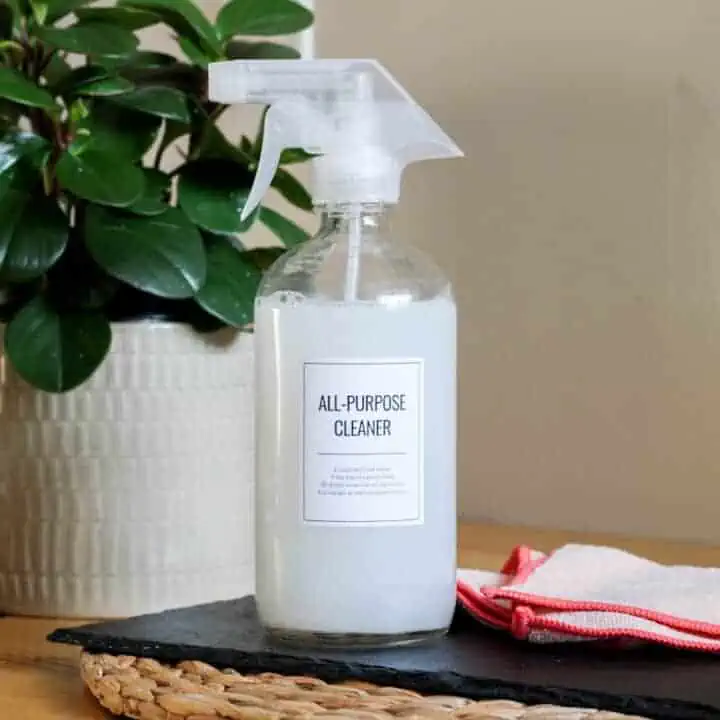
DIY All Purpose Cleaner Without Vinegar
This cleaner is made with natural, effective cleaning ingredients that smell great! It's easy to make, cost-effective and actually works!
Materials
- 16 oz glass spray bottle
- 2 cups distilled water
- 4 teaspoon liquid castile soap
- 12-13 drops of essential oil
Tools
- Funnel
Instructions
- In a 16 oz (2 cups) glass spray bottle, use the funnel (or a really steady hand!) to add water first, then liquid castile soap and essential oils.
- Give a gentle shake before each use to mix the ingredients as they will separate when stagnant.
Notes
If using scented castile soap, use only 3-5 drops of essential oil, if any.
My favorite essential oils to use are lemon (13 drops) or a combination of tea tree oil (3), rosemary (6), lavender (2) and peppermint (3).




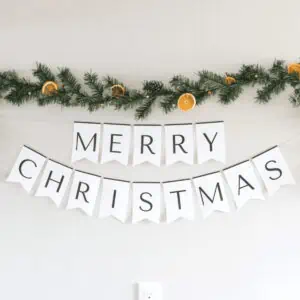
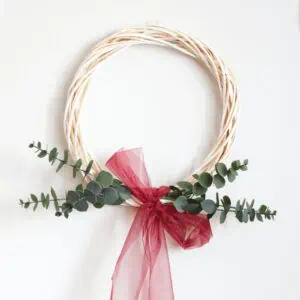
chey
These are great recommendations for a safe cleaner, and I love how you can individualize to the scent you like. I was not aware that there was a risk to surfaces with vinegar, so that you for this information! Really appreciate it!
thehomeintent
Thanks, Chey! Glad it was helpful for you!
Julie
I also am not thrilled with the strong vinegar smell associated with other natural cleaners. Love how this recipe easy and inexpensive. Dr Bronner's unscented baby is one of my favorites. Thanks for sharing.
thehomeintent
Glad you liked it! I also love Dr. Bronner's unscented baby.
Julie
This was so thorough! Great information -- I didn't even consider the acidity of vinegar on surfaces! I love castile soap, however. I really should use it more often! Thank you for this great post and detailed wisdom!
thehomeintent
I'm so happy this was helpful information! Thanks so much for reading.
Tonya
I love to use all-natural all-purpose sprays. I’m excited to try this recipe!
thehomeintent
Hey Tonya, me too! I'm excited for you to try it and hope you love it.
Diane Gail
Great recipe! So nice to have a change from the oh-so-popular vinegar based sprays. Thank you!
thehomeintent
Thanks, Diane!
Rhianna
Wondering if you can use this on natural stones?
Errika
From what I understand, you want to avoid acidic products when it comes to cleaning natural stone. Castile soap is basic, having a pH of 8.9. So in theory, it should be fine to use on natural stone, but I haven't personally tried it! I highly recommend doing a spot test in an area that no one sees, just to be sure, before using it on the whole surface. I hope that helps!
Lindsay
Hi! Since this spray doesn't sanitize, I'm curious what you use for that? I'm specifically of thinking of cleaning kitchen counters after working with raw meat. Thank you!
Errika
Use a combination of white vinegar and water in a 1:1 ratio. Keep that in a spray bottle and use it to disinfect counters. Spray and let sit 5 minutes before wiping. That does the trick!
Anne
Love your site but too many ads. Difficult to even get to the end of the page!
Errika
Thanks for the feedback, Anne! I do include the "jump to recipe" or jump to how-to" button at the top of recipe or DIY posts so you can skip past everything else if you wish.